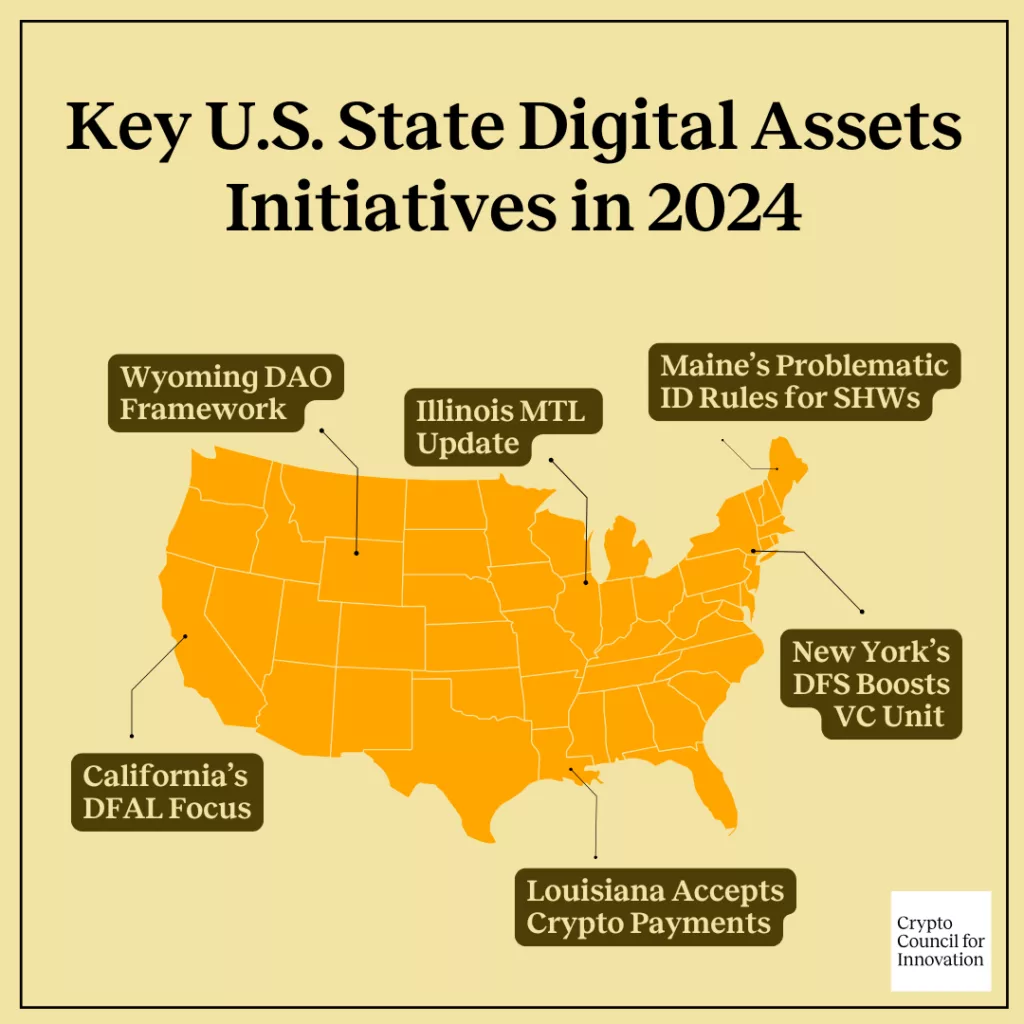
Summary:
- Q4 saw states ramping up on preparations, refining digital asset frameworks, and addressing the year’s lingering regulatory challenges in anticipation of an active 2025.
- California’s Assembly Bill 1934 delayed the implementation deadline for the Digital Financial Assets Law, granting industry and regulators additional time to build out the state’s new rules for digital asset businesses.
- While states like Vermont and New Hampshire modernized money transmitter laws to include digital assets, others, like Maine, passed restrictive measures for self-hosted wallets.
- States like Wyoming and Louisiana forged ahead with legal frameworks for DAOs.
As we close out a busy Q4, we’re reflecting on key regulatory developments during this time across the U.S. and preparing for what lies ahead in the digital assets landscape. Compared to the rest of the year, Q4 stood out as the quiet before the storm. States largely spent the end of the year working behind the scenes to implement bills that were passed by their legislatures and teeing up efforts to guide next year’s legislative sessions.
California’s recent passage of AB 1934 and ongoing regulatory updates in other states underscore the momentum for digital asset frameworks and the complexities that come with varied state approaches. Looking into next year, the groundwork set by these actions positions us for an active year as states continue to shape their digital finance policies. For a comprehensive update, here’s a closer look at the state-level initiatives setting the stage for 2025 and beyond.
California AB 1934
At the center of the US digital asset policy landscape is California, which concluded its legislative session with the passage of Assembly Bill 1934 in September. This law signals California’s commitment to a robust digital asset regulatory environment that seeks to balance innovation with consumer protection.
For those that need a refresher, AB1934 extends the implementation deadline for the Digital Financial Assets Law (DFAL), a comprehensive regulatory framework introduced in 2023 that governs the operations of digital financial asset businesses in California. Building on the New York BitLicense and limited-purpose trust charter regulations for virtual currency businesses, DFAL’s provisions include a rigorous licensing process, supervisory protocols, and regulatory pathways for stablecoin issuance.
California’s decision to delay DFAL’s implementation date, along with additional funding from the state legislature, represents an essential step toward making the DFPI capable of effectively managing digital asset licensing. The state’s proactive approach signals a commitment to refining its framework for efficiency and inclusivity, aligning regulatory requirements with industry realities. CCI’s support letter for AB 1934 sheds light on these improvements, while also urging DFPI to address DFAL’s structural challenges, including its broad scope, ambiguous definitions, and insufficient clarity for prospective licensees.
Lessons for California from New York’s Model
Given certain challenges New York faced while standing up its regulatory regime, California’s Department of Financial Protection and Innovation (DFPI) has a tall feat ahead of itself. Businesses seeking licenses and those already operating in New York continue to face application and product approval delays. While undergoing NY’s robust process and securing approval to operate in the state can be viewed as a significant sign of legitimacy for digital asset businesses, it can be especially prohibitive for digital asset startups to break into the state. This can result in consumers losing access to innovative products and services, while other jurisdictions reap the benefits of new tax revenue and job growth.
Addressing Structural Issues
Illinois, New Hampshire, Vermont and Maine Crypto Updates
Despite California’s decision to establish a regulatory framework devoted specifically to digital assets, not all states have taken the same approach this year. Illinois declined to advance legislation that would have established a similar state licensing regime, instead opting to modernize its money transmitter statute, which many digital asset businesses in the state utilize. Other states also opted to update their money transmitter regulations to address digital assets, including New Hampshire, Vermont, and Maine.
However, Maine’s legislation also included highly problematic restrictions for self-hosted wallets that could potentially require digital asset businesses to verify the identities of every self-hosted wallet operating in the state. It will prove incredibly difficult–if not impossible–for virtual currency businesses to comply with this requirement, which hasn’t been advanced anywhere else in the country, including at the federal level. In contrast to Maine’s approach on self-hosted wallets, other states like Oklahoma and Arkansas have advanced legislation safeguarding consumers’ access to this technology.
DAOs
One of the most innovative trends at the state level when it comes to digital asset policy has been the spread of legislation to establish novel legal frameworks for DAOs. Wyoming, Louisiana, and New Hampshire have each enacted legislation passed by their state houses that propose fit-for-purpose legal vehicles for these Web3 native governance tools. Wyoming’s approach to digital assets has been especially forward-leaning. Read CCI’s testimony before the legislature’s Select Committee on Blockchain, Financial Technology, and Digital Innovation Technology for a deep dive on new initiatives the state has been exploring.
Louisiana Offers Digital Asset Payments for State Services
Louisiana also rolled out new rules allowing state agencies to accept digital assets as payment for state services, such as hunting and fishing licenses. The Bayou State joins Colorado as the latest to explore accepting digital asset payments. Digital assets offer a host of benefits to the payments space, including faster transfers and more efficient settlement processes. It is notable that state agencies, which are responsible for collecting trillions of dollars a year, are becoming early adopters.
Virginia’s Upcoming Blockchain Task Force Report
Virginia Governor Glenn Youngkin signed into law legislation to establish the state’s first Blockchain and Cryptocurrency Commission, which has been tasked with studying and making recommendations for how the state can lead on developing blockchain technology and digital asset initiatives. A report on the impact of the blockchain industry on Virginia is expected as a result of the legislation no later than December 1 of this year. New York’s State Legislature also passed a similar bill, which is now on the desk of Governor Kathy Hochul for her consideration.
The Path Forward for State-Level Crypto Regulation
It remains to be seen whether states will standardize their approach to digital assets. California’s regulatory framework contrasted with Maine’s approach on self-hosted wallets offers the starkest example of the consequences of a patchwork approach to regulating this industry. Task forces and commissions offer an opportunity for public and private stakeholders to deliberate on challenging issues outside the often hectic and high-pressure demands of the legislative process, resulting in recommendations which are often more thoughtful and consensus-based. As state policymakers continue to propose new and sometimes diverging regulations for digital assets, it’s clear the future of digital finance in the US is unfolding one state at a time.

























